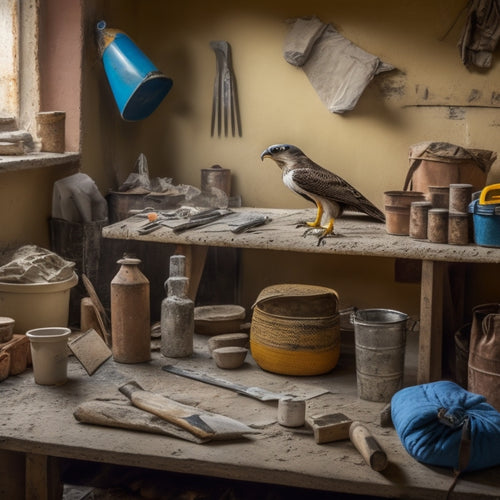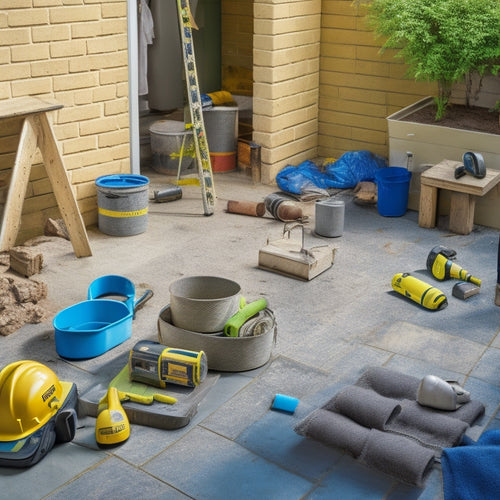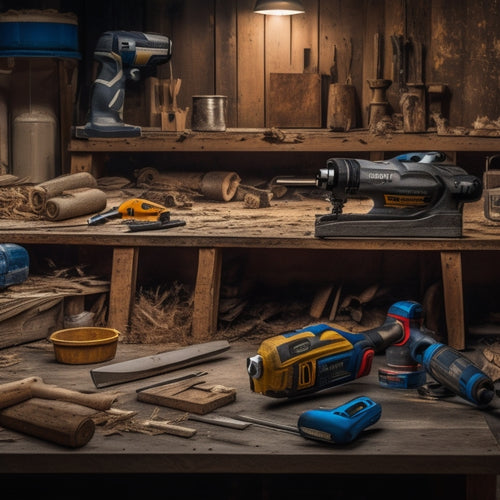
3 Best DIY Planning Checklist for Renovation
Share
As you prepare for your renovation project, a solid DIY planning checklist is essential to transforming your vision into reality. You'll need to measure up with important concrete measurement tools like tape measures, laser levels, and digital inclinometers to guarantee accuracy. Next, calculate materials and quantities with precision, creating a detailed list and quantity takeoff to visualize your project and identify potential roadblocks. Finally, consider scheduling and budgeting factors, like timeline management, cost estimation, and price research, to maintain focus and allocate resources effectively. Now, you're ready to plunge into the specifics of your renovation plan and uncover the intricacies that will bring your project to life.
Key Takeaways
• Ensure accurate measurements using essential tools like tape measures, laser levels, and digital inclinometers to avoid costly mistakes.
• Calculate materials and quantities precisely, including a detailed material list and quantity takeoff, to prevent waste and delays.
• Create a realistic project schedule with timeline management, cost estimation, and resource allocation to stay on track and within budget.
• Research and compare prices for materials and services to optimize budget and allocate a contingency fund for unexpected expenses.
• Consider consulting professionals, such as architects or contractors, for accurate cost estimates and expert guidance throughout the renovation process.
Essential Concrete Measurement Tools
You'll need four vital concrete measurement tools to accurately assess your renovation project's foundation, ensuring a solid base for your DIY endeavors. These must-haves will help you visualize and validate your design, ensuring a flawless execution.
First, a reliable tape measure will be your go-to for measuring lengths, widths, and heights. Look for one with a sturdy hook and a smooth rewind mechanism to make measurements a breeze.
Next, a laser level will come in handy for checking the levelness and plumbness of surfaces. This tool is especially important when working with concrete, as even the slightest deviation can lead to costly mistakes. With its precise beams, you'll be able to detect even the tiniest imperfections.
Additionally, a digital inclinometer will help you measure angles and slopes with precision.
Finally, a concrete test hammer will allow you to assess the strength and density of your concrete foundation.
Calculating Materials and Quantities
With your concrete measurements in hand, it's time to translate those numbers into tangible materials and quantities, guaranteeing you have every necessary component to bring your design to life. This is where material estimation comes in – the process of calculating the amount of materials needed to complete your renovation. You'll need to take into account every aspect of your project, from flooring and walls to fixtures and finishes.
Start by creating a detailed list of materials, including quantities and specifications. This will help you visualize your project and identify potential roadblocks.
Next, perform a quantity takeoff, which involves counting and measuring the individual components required for each task. For example, if you're installing new flooring, you'll need to calculate the number of planks, adhesive, and underlayment needed.
Be meticulous in your calculations, as even small errors can lead to costly delays or material waste. Think about using online calculators or consulting with a professional to guarantee accuracy.
With a thorough material list and quantity takeoff, you'll be well-prepared to tackle your renovation with confidence and precision.
Scheduling and Budgeting Considerations
As you move forward with your renovation, pinpointing key milestones and allocating resources becomes vital, guaranteeing your project stays on track and within budget.
Effective timeline management is essential to avoid delays and costly setbacks. Create a detailed project schedule, breaking down each task into manageable chunks, and assign realistic deadlines to each phase. This will help you visualize the entire renovation process, identify potential bottlenecks, and make necessary adjustments.
Accurate cost estimation is another significant aspect of budgeting. Make a thorough list of all materials, labor, and miscellaneous expenses, and allocate a contingency fund to cover unexpected costs.
Be sure to research and compare prices for different materials and services to get the best deals. Consider consulting with professionals, such as architects or contractors, to get a more accurate estimate of the project's costs.
Frequently Asked Questions
How Do I Handle Unexpected Issues That Arise During Renovation?
When unexpected issues pop up during renovation, don't panic!
You'll need to make budget adjustments on the fly. First, assess the problem and prioritize solutions.
Communicate clearly with your contractor to get their expert input. Be prepared to negotiate and make tough decisions.
Stay flexible, and remember, it's better to spend more now than to risk costly rework later.
Keep your cool, and you'll navigate these unexpected twists like a pro.
Can I Reuse or Recycle Old Materials From the Renovation?
As you're ripping out old fixtures, you're probably wondering: can I breathe new life into these discarded gems?
Coincidentally, upcycling is a great way to reduce waste and get creative!
You'll find plenty of material sourcing inspiration online, from turning old pallets into planters to repurposing vintage tiles as coasters.
Get crafty and give old materials a fresh spin – it's a win-win for your wallet and the environment!
Do I Need to Hire a Professional for Electrical or Plumbing Work?
When tackling electrical or plumbing work, you're not just dealing with wires and pipes - you're handling potential safety risks.
Don't take a chance with electrical safety; hire a pro to guarantee your renovation meets code.
And, don't forget to secure necessary plumbing permits before starting the job.
Are There Any Specific Renovation Regulations in My Area?
Don't assume you can just start hammering away - you'll need to navigate local building codes and zoning laws first.
Imagine your dream renovation halted by a surprise visit from the city inspector. Avoid that nightmare by researching your area's specific regulations.
Check with your local government website or consult with a permit expert to guarantee you're compliant.
You'll save time, money, and stress by getting it right from the start.
How Can I Minimize Disruption to My Daily Routine During Renovation?
As you're about to plunge into renovation chaos, you're wise to think about minimizing disruption to your daily routine.
You'll want to plan for temporary living arrangements, like setting up a makeshift kitchen or shower area, to keep your daily habits intact.
Don't forget noise management - schedule noisy tasks for when you're out, or invest in earplugs and white noise machines to maintain sanity.
With a bit of creativity, you'll navigate this renovation rollercoaster with ease!
Conclusion
You've made it to the final stretch of your DIY planning checklist for renovation!
With essential concrete measurement tools, calculated materials and quantities, and scheduling and budgeting considerations in place, you're ready to break ground.
Did you know that according to the National Association of Home Builders, 80% of homeowners undertake DIY projects to increase their home's value?
Get ready to join the ranks and transform your space into a stunning oasis that's both functional and fabulous!
Related Posts
-

Top Tools for DIY Home Renovation Plastering Success
To achieve DIY home renovation plastering success, you'll need a range of essential tools. Start with hand tools like...
-

7 Patio Safety Tips for DIY Renovation Projects
As you begin your DIY patio renovation project, prioritize safety by evaluating the worksite for tripping hazards and...
-

10 Best Power Tools to Buy for Home Renovation
To tackle your home renovation project efficiently, you'll need the right power tools for the job. A cordless drill f...


